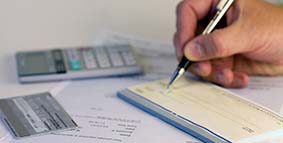

Know the costs of convenience
Convenience checks are blank checks you might get in the mail from your credit card company that allow you to write a check for payment. This check payment shows up as a charge on your credit card statement. These credit card checks offer a quick way to write yourself a loan (also known as a cash advance), pay bills, or transfer other loans and card balances to your credit card account. These checks generally have different fees or interest rates than other credit card purchases, so be sure you know the costs associated with this convenience before you make it a practice.
Know the interest rate and the fees you will pay
You might think that the interest charged when spending on your credit card is all the same. Actually, your credit card company generally puts spending into two categories: purchases and cash advances. The interest rate on the convenience checks you receive are charged at the cash advance rate – often higher than the stated purchase rate.
When using credit card convenience checks, you can also expect to incur a transaction fee usually as a percentage amount of each check. For example, if you wrote a check for $1,000 and the convenience check fee was five percent of that amount, you would pay $50 in addition to the interest charged.
Since the convenience checks are really a cash advance loan, you may not be allowed an interest-free period to pay the loan without interest accruing. Many lenders begin charging interest when the check posts to your account, even if they otherwise give you time to repay your credit card purchases interest-free.
If you are offered a low interest rate initially for a cash advance, find out what interest rate you will pay when the introductory period is over. Think twice about repeatedly transferring balances from one credit card to another, because you could end up paying costly fees that more than offset the attractive, promotional interest rate.
Most consumers believe that they will pay off the debt before the introductory rate expires, but many find they cannot. For more information about credit cards, visit FDIC Consumer News: Credit Cards.
Avoid fees and penalties when you deposit a convenience check into your bank account
Know what the current limit for cash advances is on your credit card in case your credit company reduces the amount you may borrow on your card. Before you write a check, make sure that it will not put you over your limit for cash advances. Monitoring your balance and credit limit may also potentially make you aware of fraudulent activities.
If the convenience check puts your card balance over the limit, your card issuer may not honor the check. The returned check could trigger overdraft fees from your bank, returned-check fees from merchants or vendors, and over-limit fees from your card issuer.
Keep in mind that excessive over the limit usage of your credit card could have a negative impact on your credit score. For more information on credit scores, visit FDIC Consumer News: Credit and Credit Scores.
Understand when your card company might not honor a check. Consider calling your card company to verify your understanding of its policies. In addition, you may want to call your credit card company again after you deposit the check into your bank and before you spend any of that money, to make sure the card issuer has honored the check.
When you use your credit card for purchases, the Truth in Lending Act gives you the ability, under certain circumstances, to dispute billing errors until the problem is corrected. However, in cases of fraud involving convenience checks, the same protections are more difficult to extend even though they are related to your credit card account. Note, with convenience checks, you may not receive any rebates or associated awards as you would using your credit card under prescribed conditions.
Look for and shred convenience checks you do not plan to use
If you decide to keep the convenience checks you are sent, be sure to keep them safe so no one uses them without your knowledge. If you decide not to keep them, be sure to destroy them. Thieves rummage through trash looking for valuable papers such as convenience checks and bank statements, so do your best to destroy these documents before you toss them away.
Consider asking your card issuer to stop mailing you convenience checks if you are sure you do not want them
Stopping unsolicited convenience checks saves paper, avoids the risk the checks might be stolen from your mailbox or home, and helps discourage you from turning to the checks. Convenience checks can be expensive and many consumers find that they should be used sparingly, if at all. You may want to consider other options.
While a convenience check from your credit card issuer may seem like a great way to write yourself a loan, pay bills, or transfer other loans to your credit card account, please be careful and do your homework before you use it.
Additional resources
Consumer Financial Protection Bureau (CFPB): Can my credit card company charge me a fee for using a convenience check if the interest rate on the check is zero percent?
Federal Trade Commission (FTC): Using Credit Cards and Disputing Charges
For more consumer resources, visit FDIC.gov, or go to the FDIC Knowledge Center. You can also call the FDIC toll-free at 1-877-ASK-FDIC (1-877-275-3342). Please send your story ideas or comments to ConsumerNews@fdic.gov. You can subscribe to this and other free FDIC publications to keep informed!
